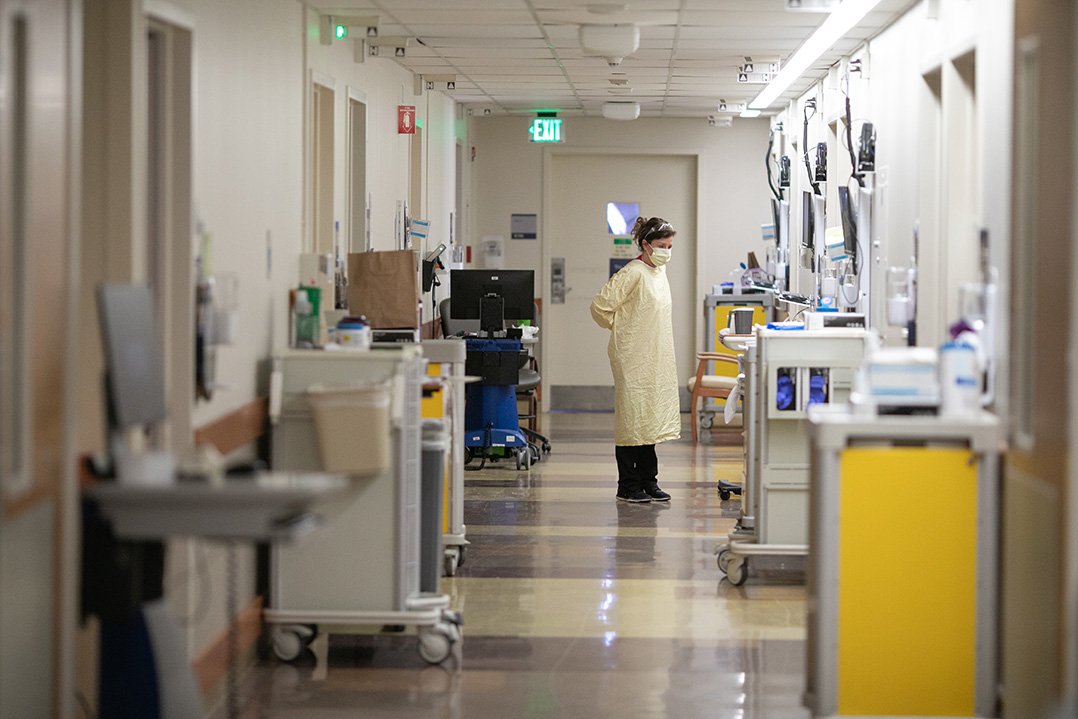
Indiana University Health doctors warned the system’s hospitals are near, at or past capacity and that most COVID-19 hospitalizations, as of Jan. 4, were caused by the delta variant, meaning Indiana could see a record-setting surge of hospitalized COVID-19 patients in the coming weeks because of the omicron variant.
Since the start of the pandemic in March 2020, COVID-19 hospitalizations and deaths have lagged behind case numbers by a few weeks. In recent weeks, the state has seen a sharp uptick in cases. The Indiana State Dept. of Health reported a statewide seven-day moving average of 8,525 cases Jan. 4, shattering the previous record of 6,888 set Dec. 7, 2020.
“The feared projections and belief is that it could go higher,” IU Health SVP and Chief Clinical Officer Dr. Chris Weaver said. “We are at the highest point we’ve been, and just to be clear, if we haven’t been, we are full and (at) about 120 percent capacity at all of our hospitals. Every single one of our 16 hospitals is stretched beyond prior belief.”
As of Jan. 4, IU Health reported 553 COVID-19 patients in its hospital system. Weaver said more than 2,000 other patients are being cared for at IU Health hospitals. Weaver said on average, six COVID-19 patients are dying per day in the IU Health system, which has four hospitals in the Indianapolis suburban region: IU Health North (Carmel), Saxony (Fishers), Tipton and West (Avon). IU Health has requested assistance from the Indiana National Guard and FEMA.
During a Jan. 4 press conference, IU Health officials mentioned creative ways the hospitals have coped as ICU beds have filled with COVID-19 patients. Ambulance bays and emergency room beds have been used, and patients with medical emergencies have been treated in waiting rooms when ERs are full.
On Jan. 4, the Indiana State Dept. of Health reported Indiana 3,207 residents were hospitalized with COVID-19.
“We have seen, consistently, a lag of about two weeks,” Weaver said of hospitalizations. “Reports on omicron have been different, requiring less hospitalization, though a significant number than other (variants) as a percentage of cases. Our hope is we don’t see the same two-week lag and climb at least with the same numbers that we have seen with the other variants, but we don’t know that, so we have to be prepared and ready for that.”
Health officials agree that the omicron variant is more contagious than previous variants, and more hospital employees have been infected by the virus, requiring isolation and hindering already short-staffed hospitals.
“If it is more contagious, then that worries us from the standpoint of even more of our team members, even though they may not require hospitalization because they are vaccinated, will be then isolated and off work if they get it,” said Dr. Michele Saysana, IU Health’s vice president of safety, quality and patient improvement and chief patient safety and quality officer.
Although therapies have rapidly advanced in the last two years, Saysana said most, including monoclonal antibodies, are in limited supply and are only available for some “very, very high-risk patients.”
Dr. Liz Linden, IU Health vice president and chief nursing officer of patient care services at Indiana University Health Adult Academic Health Center Hospitals, said the majority of hospitalized COVID-19 patients are unvaccinated. Of the vaccinated patients, most have not received a booster shot. She said most who are fully vaccinated and have received a booster present mild, cold-like symptoms.
“It’s keeping them out of the hospital, and, more importantly, it is keeping them from death,” Linden said.


